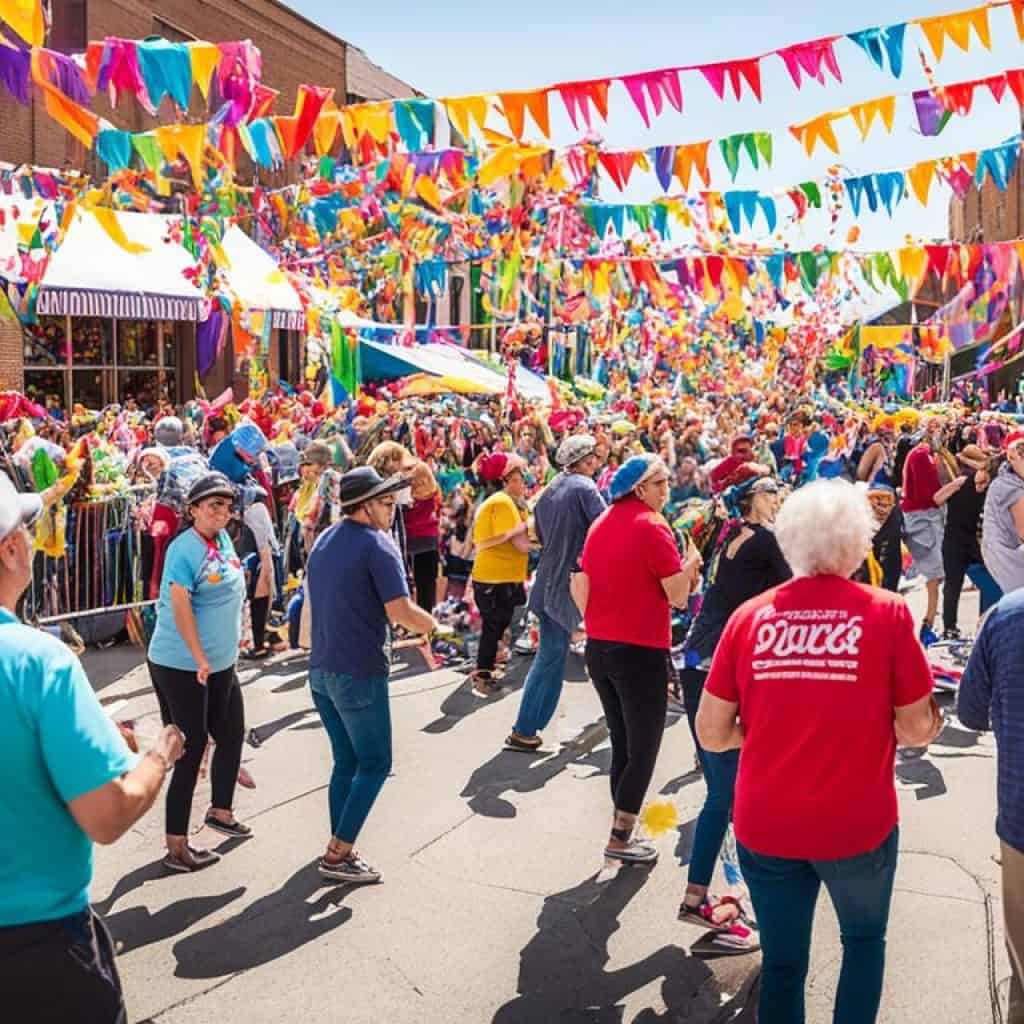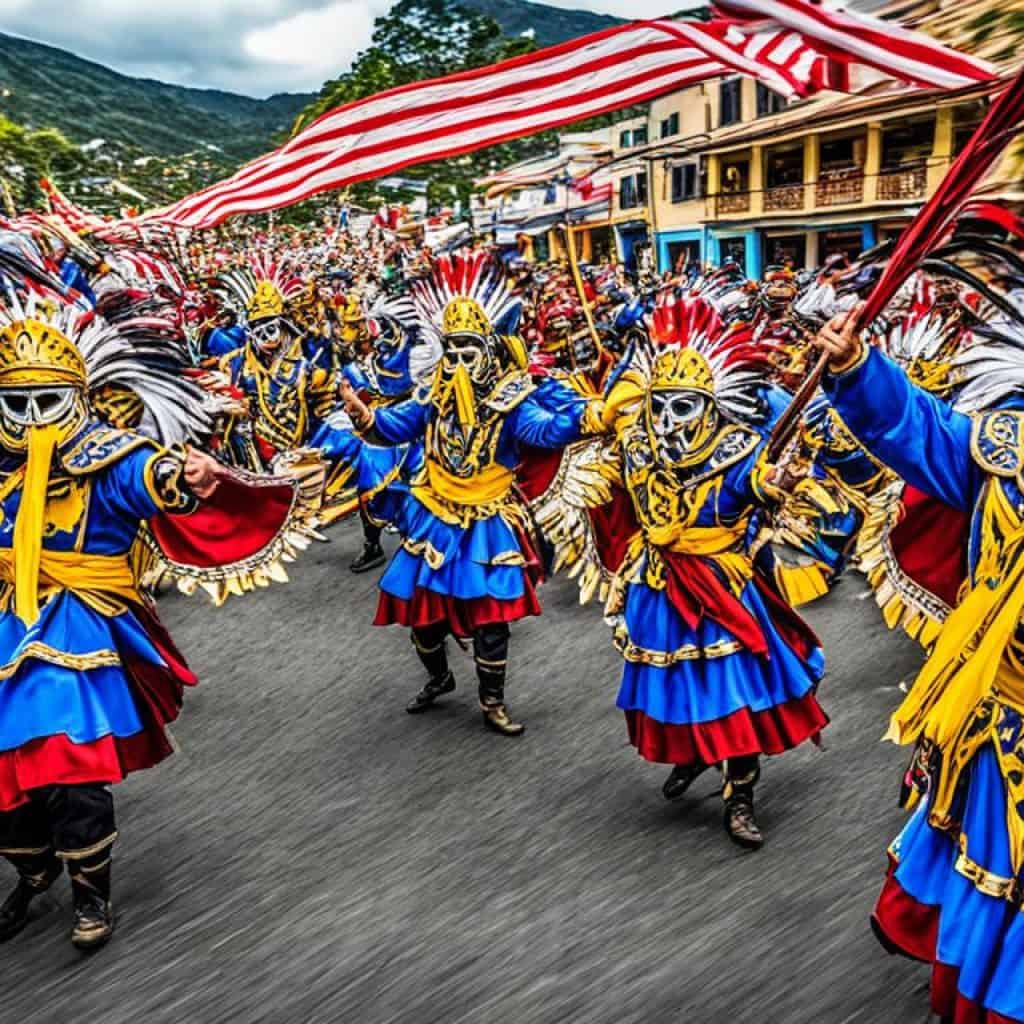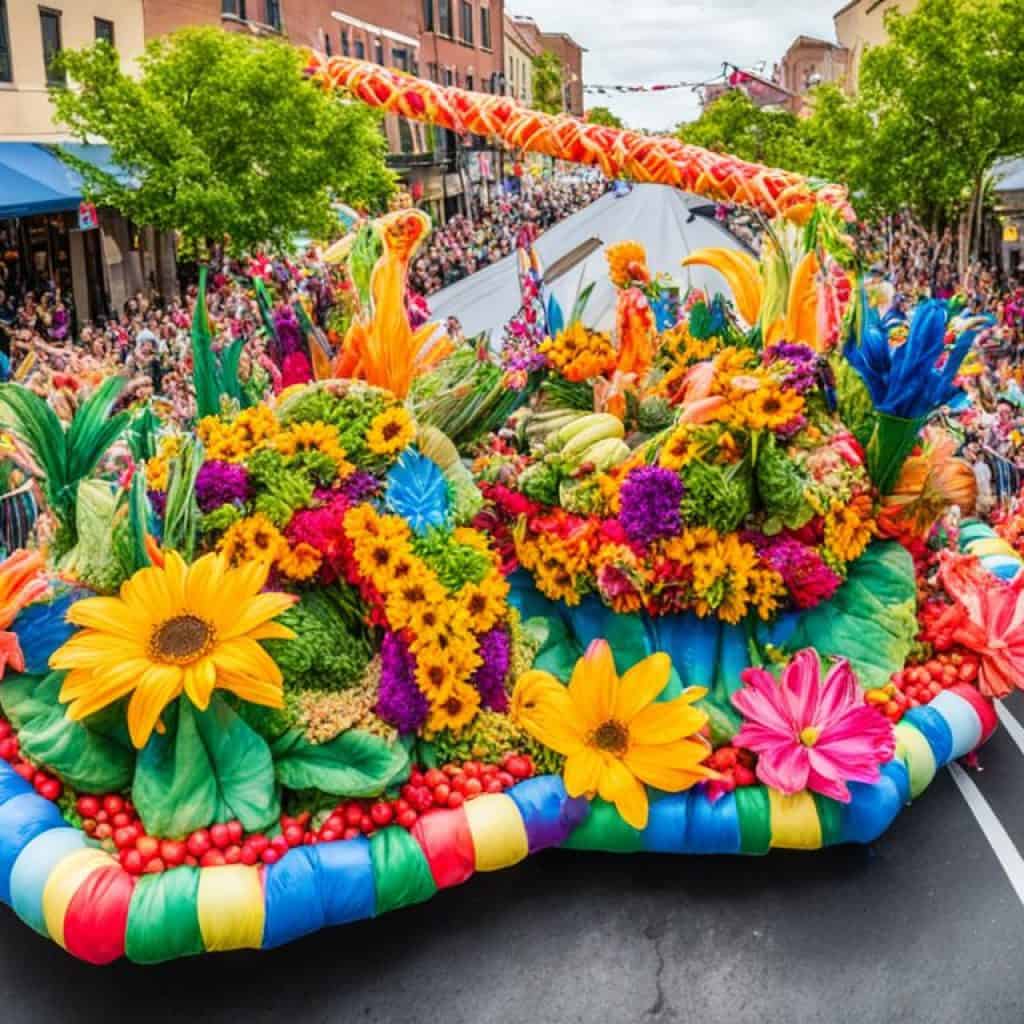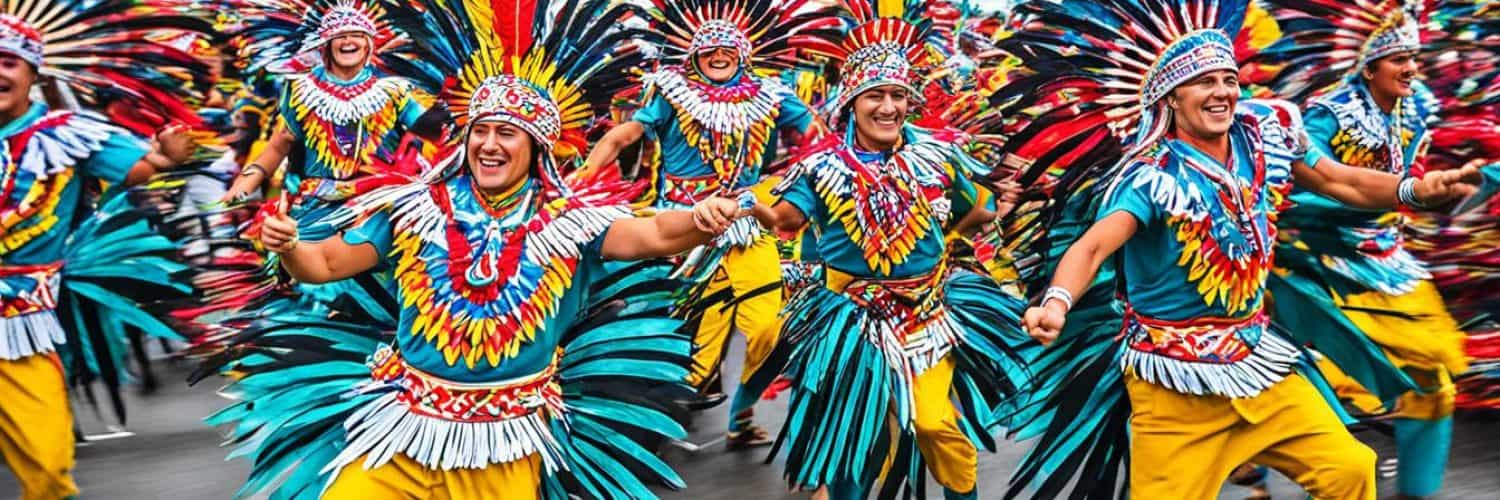The Philippines is known for its long list of festivals, both religious and non-religious. While many of these festivals have religious origins, there are also several non-religious festivals that highlight the country’s culture and traditions. These festivals showcase vibrant celebrations, unique secular events, and traditional gatherings that attract both locals and tourists. From lively street parades to floral floats and festive dances, these non-religious festivals offer a colorful and energetic environment for everyone to enjoy.
Have you ever wondered how the Philippines celebrates its non-religious festivals? Do you think these festivals can still capture the essence of the country’s culture without any religious influence? Let’s dive into the world of non-religious festivals in the Philippines and explore the unique festivities and traditional gatherings that make these secular events so special.
Key Takeaways:
- The Philippines is home to a wide range of festivals, both religious and non-religious.
- Non-religious festivals showcase the country’s cultural heritage and traditions.
- These festivals offer vibrant celebrations, unique secular events, and traditional gatherings.
- They attract both locals and tourists who want to experience the lively and energetic atmosphere.
- Non-religious festivals in the Philippines can still capture the essence of the country’s culture without any religious influence.
Religious and Non-religious Festivals in the Philippines
The Philippines is renowned for its diverse festivals, encompassing both religious and non-religious celebrations. These festivals profoundly reflect the country’s rich culture and traditions, providing a platform for Filipinos to come together and commemorate. While many festivals are centered around religious observances, there are also numerous non-religious festivals that highlight various aspects of Filipino culture, such as gastronomy, music, dance, and agriculture. Drawing visitors from all corners of the globe, these festivals offer a remarkable insight into the vibrant heritage of the Philippines.
Non-religious Festivals in January
January is a month filled with vibrant and exciting non-religious festivals in the Philippines. These festivals celebrate different themes and showcase the rich cultural heritage of the country. Let’s take a closer look at some of the most popular non-religious festivals that take place in January:
Black Nazarene Procession of Quiapo
The Black Nazarene Procession of Quiapo is one of the most iconic festivals held in Manila during January. This festival pays homage to the Black Nazarene, a life-sized wooden sculpture of Jesus Christ, and attracts thousands of devotees who join the procession to show their faith and seek blessings. The streets come alive with colorful processions, religious chants, and fervent prayers, creating a truly spiritual atmosphere.
Ati-atihan Festivity of Kalibo
The Ati-atihan Festivity of Kalibo is a lively and energetic festival held in Aklan Province. It is a week-long event that commemorates the arrival of the Malay settlers and the friendship between the Ati indigenous people and the Malay settlers. Participants paint their faces with vibrant colors and wear traditional costumes as they dance to the rhythmic beat of drums. This festival is a celebration of unity, friendship, and cultural diversity.
Sinulog Festival of Cebu City
The Sinulog Festival is one of the most famous and highly anticipated festivals in the Philippines. Held in Cebu City, it pays tribute to the Santo Niño (Child Jesus). The festival features a grand street parade with participants dressed in colorful and intricately designed costumes, showcasing traditional dances and music. The highlight of the festival is the Sinulog Grand Parade, where dancers perform the Sinulog dance, characterized by its flowing movements and rhythmic steps.
Dinagyang Festival of Iloilo City
The Dinagyang Festival is an exhilarating event held in Iloilo City. It is a vibrant celebration that honors the Santo Niño, similar to the Sinulog Festival. The festival showcases street dances performed by participants in colorful costumes, imitating the movements of the Ati warriors. The festival also includes religious activities, cultural exhibits, and a fireworks display, creating a festive and joyous atmosphere.
These non-religious festivals in January offer a unique opportunity to immerse yourself in the rich cultural heritage of the Philippines. The vibrant street parades, face painting, tribal dances, and overflowing foods and drinks create a lively and energetic atmosphere that is sure to leave you with unforgettable memories.
Experience the beauty, diversity, and joy of these non-religious festivals in January, and embrace the spirit of celebration that permeates the Philippines.
Non-religious Festivals in February
February is an exciting month in the Philippines, filled with a variety of non-religious festivals that showcase the beauty of nature and the diversity of cultures in the country. Two notable festivals in February are the Panagbenga Festival in Baguio City and the Bacolaodiat Festival in Bacolod City.
Panagbenga Festival
The Panagbenga Festival, also known as the “Flower Festival,” is one of the most popular festivals in Baguio City. It is a month-long celebration that pays tribute to the blooming of flowers and serves as a symbol of resilience after the devastating 1990 earthquake. The festival features stunning floral floats adorned with vibrant flowers, street dancing competitions, and a grand parade showcasing the creativity and artistry of Filipinos.
Bacolaodiat Festival
The Bacolaodiat Festival is a unique cultural celebration held in Bacolod City during the Chinese New Year. It is a fusion of Filipino and Chinese traditions, showcasing the rich heritage and vibrant culture of the Chinese community in Bacolod. The festival includes street dance competitions, cultural presentations, and lantern parades that illuminate the city streets at night.
The Bacolaodiat Festival offers a wonderful opportunity to experience the lively atmosphere of Chinese New Year celebrations while immersing oneself in the rich Filipino-Chinese heritage.
These festivals in February provide a unique and vibrant experience for both locals and tourists. They offer a perfect blend of nature, culture, and the joyous spirit of the Filipinos. Whether you are captivated by the colorful floral floats of the Panagbenga Festival or enthralled by the vibrant lantern parades of the Bacolaodiat Festival, February in the Philippines is a time to celebrate and embrace the wonders of non-religious festivals.
| Festival | Location | Date |
|---|---|---|
| Panagbenga Festival | Baguio City | Whole month of February |
| Bacolaodiat Festival | Bacolod City | During the Chinese New Year |
Non-religious Festivals in May
May is a month full of vibrant and exciting non-religious festivals in the Philippines. These festivals offer a feast for the senses, showcasing the country’s rich cultural heritage and traditional practices. One of the most dazzling festivals during this month is the Pahiyas Festival in Lucban, Quezon.

The Pahiyas Festival is a unique celebration where houses are adorned with colorful decorations and an abundance of vegetables. The locals believe that by displaying their harvest, they will receive blessings for a fruitful year. Visitors can even pick the vegetables for free, adding a fun and interactive element to the festival. The streets come alive with festive music, delicious food, and captivating cultural performances that highlight the essence of Filipino tradition and hospitality.
Another fascinating festival in May is the Abaca Festival in Catanduanes. This festival pays homage to the significance of abaca, also known as Manila hemp, in the province. Abaca is a natural fiber native to the Philippines and is widely used for various purposes, including textiles, handicrafts, and even paper. The Abaca Festival showcases the intricate craftsmanship and creativity of the local artisans through exhibitions, workshops, and fashion shows.
“May is a month full of vibrant and exciting non-religious festivals in the Philippines.”
These non-religious festivals in May offer a unique opportunity to immerse yourself in the rich cultural tapestry of the Philippines. They provide a glimpse into the daily lives, traditions, and customs of the Filipino people. From the visually stunning decorations to the mouth-watering local delicacies, these festivals create a lively and energetic atmosphere that will surely leave visitors in awe.
| Festival | Location | Date |
|---|---|---|
| Pahiyas Festival | Lucban, Quezon | May 15 |
| Abaca Festival | Catanduanes | May 24-26 |
These festivals are not only a source of entertainment but also a way to appreciate and preserve the cultural heritage of the Philippines. They provide an opportunity for locals and tourists alike to celebrate the unique traditions, artistry, and resilience of the Filipino people. If you’re planning a visit to the Philippines in May, make sure to experience the vibrant non-religious festivals that will leave you with unforgettable memories.
Non-religious Festivals in August
August is a month of vibrant celebrations in the Philippines, with a variety of non-religious festivals that showcase the country’s rich culture and traditions. Two notable festivals that take place during this month are the Kadayawan Festival in Davao City and the Kaamulan Festival in Bukidnon.
The Kadayawan Festival is a grand celebration of thanksgiving for the abundant harvest in the region. It is known as one of the biggest festivals in the country and attracts visitors from all over the world. The festival showcases the beauty of Davao City’s agricultural heritage, with a focus on flowers and fruits. Colorful parades, street dances, and cultural performances create a lively atmosphere that brings together locals and tourists alike.
The Kaamulan Festival, on the other hand, highlights the culture and traditions of the indigenous tribes in Bukidnon. It is a time of unity and gathering for the different tribes, allowing them to showcase their unique rituals, dances, music, and crafts. The festival serves as a platform for cultural preservation and appreciation, providing an immersive experience for attendees.
Both the Kadayawan Festival and the Kaamulan Festival offer a unique glimpse into the diverse cultural heritage of the Philippines. These festivals celebrate the abundance of nature, the resilience of the people, and the rich traditions that have been passed down through generations. Visitors can immerse themselves in the vibrant festivities and experience the joyous spirit of these non-religious festivals in August.
| Festival | Location | Highlights |
|---|---|---|
| Kadayawan Festival | Davao City |
|
| Kaamulan Festival | Bukidnon |
|
Non-religious Festivals in October
October is an exciting month in the Philippines, filled with vibrant non-religious festivals that showcase the rich culture and spirit of the Filipino people. Let’s explore two captivating festivals that take place in October:
MassKara Festival in Bacolod City
The MassKara Festival is a world-renowned festival held in Bacolod City, also known as the City of Smiles. This lively festival is a celebration of joy and resilience, as the locals don colorful masks adorned with smiling faces. The festival’s main highlight is the street dancing competition, where participants showcase their vibrant costumes and energetic dance moves. The MassKara Festival is a testament to the optimism and unity of the people of Bacolod City, as they find happiness and strength in the face of challenges.
Bambanti Festival in Isabela
In the province of Isabela, the Bambanti Festival takes center stage in October. This festival is a celebration of Isabela’s cultural heritage and agricultural abundance. Symbolizing scarecrows, which protect crops from birds, the festival showcases elaborate scarecrow displays creatively crafted by the locals. The Bambanti Festival features street parades, dance performances, and trade fairs that highlight the province’s rich agricultural traditions. It serves as a colorful tribute to the hardworking farmers and fertile lands of Isabela.
These non-religious festivals in October offer a delightful experience for locals and visitors. With their lively performances, creative costumes, and festive atmosphere, they truly embody the vibrant spirit of the Filipino people and their unique cultural heritage.
Non-religious Festivals in April
In the month of April, the Philippines comes alive with an exciting mix of non-religious festivals that showcase the country’s rich heritage and traditions. These festivals bring together locals and tourists for a vibrant celebration of history, culture, and culinary delights. Two notable festivals that take place in April are the Moriones Festival in Marinduque and the Bangus Festival in Dagupan City.
Moriones Festival
The Moriones Festival, held in Marinduque, is a unique blend of history, culture, and religious symbolism. This festival reenacts the story of St. Longinus and Jesus Christ through elaborate costumes and performances. Participants don colorful masks and attire, reminiscent of the Roman soldiers during the time of Christ, as they roam the streets in search of the repentant Longinus. This festival is a visual spectacle that attracts visitors from all over the world.

Bangus Festival
In Dagupan City, the Bangus Festival takes center stage in April. This festival celebrates the city’s abundant aquaculture, specifically focusing on the bangus or milkfish. Known as the “Bangus Capital of the Philippines,” Dagupan City pays homage to this fish species that contributes to the city’s economy and culinary reputation. Festival-goers can enjoy various activities such as a street parade, cooking contests, and of course, savoring delicious bangus dishes.
These non-religious festivals in April offer a glimpse into the creativity, talent, and dedication of the Filipino people in preserving their traditions and heritage. Whether you’re interested in historical reenactments or indulging in delicious food, these festivals provide a unique and memorable experience for visitors.
Non-religious Festivals in December
December is a month of festive celebrations in the Philippines, filled with joy and merriment. One of the most enchanting non-religious festivals during this season is the Parol Festival in San Fernando, Pampanga. This captivating event showcases the extraordinary craftsmanship and artistry of the locals in creating parols, intricately designed lanterns that symbolize the Star of Bethlehem. The festival fills the streets with vibrant colors and mesmerizing lights, creating a magical atmosphere that truly captures the spirit of Christmas.
Another delightful festival in December is the Paskuhan Village in San Fernando, La Union. This enchanting village transforms into a Christmas wonderland, dazzling visitors with stunning light displays, vibrant parades, and breathtaking cultural performances. The air is filled with the joyful sounds of Christmas carols, while the aroma of delicious traditional Filipino delicacies wafts through the air. The Paskuhan Village truly immerses visitors in the festive spirit, spreading joy and happiness to all who visit.
These non-religious festivals in December bring communities together, allowing both locals and visitors to experience the magic of the holiday season. The Parol Festival and Paskuhan Village highlight the creativity, artistry, and vibrant culture of the Philippines, making them must-visit destinations for anyone seeking a truly unique and joyful Christmas experience.
Non-religious Festivals in Bacolod City
Bacolod City, known as the City of Smiles, is a vibrant destination in the Philippines that offers a variety of non-religious festivals throughout the year. These festivals showcase the creativity, joy, and resilience of the people of Bacolod City, creating an atmosphere of celebration and cultural appreciation.
One of the most famous festivals in Bacolod City is the MassKara Festival, celebrated in October. This festival is a symbol of the city’s resilience and unity, arising from the challenges the city faced in the 1980s. The MassKara Festival is known for its elaborate masks adorned with vibrant colors and intricate designs, reflecting the optimism and positivity of the Bacolodnons. The festival also features lively street dancing competitions where participants showcase their talents and creativity through captivating performances.
Another exciting festival in Bacolod City is the Bacolaodiat Festival, celebrated during the Chinese New Year. The festival pays tribute to the city’s rich Chinese heritage and features a series of events, including street dance competitions, cultural presentations, and lantern parades. The Bacolaodiat Festival is a dazzling spectacle that showcases the fusion of Filipino and Chinese cultures, bringing together locals and tourists to celebrate the start of the lunar year with joy and enthusiasm.

These non-religious festivals in Bacolod City not only entertain and engage visitors but also promote cultural understanding and appreciation. They serve as a platform for the people of Bacolod City to showcase their talents, share their traditions, and celebrate their unique identity. Each festival brings an explosion of colors, music, and energy, creating an unforgettable experience for everyone.
Festivals in Bacolod City
| Festival | Celebration Month | Highlights |
|---|---|---|
| MassKara Festival | October | Elaborate masks, vibrant street dancing competitions |
| Bacolaodiat Festival | Chinese New Year | Street dance competitions, cultural presentations, lantern parades |
These festive events in Bacolod City are not to be missed if you want to immerse yourself in the city’s vibrant culture, witness incredible performances, and experience the warm hospitality of the people. Whether you’re a local or a visitor, these non-religious festivals in Bacolod City will surely leave you with beautiful memories and a deeper appreciation for the city’s rich heritage.
Non-religious Festivals in Baguio City
Baguio City, known as the “Summer Capital of the Philippines,” hosts a variety of non-religious festivals that celebrate nature, creativity, and culture. One of the most renowned festivals in Baguio City is the Panagbenga Festival, which takes place in February each year. This vibrant festival is a tribute to the blooming of flowers and a symbol of resilience after the devastating 1990 earthquake.
The Panagbenga Festival features captivating activities that showcase the city’s flora and the creativity of its people. The highlight of the festival is the Grand Float Parade, where beautifully crafted floral floats adorned with exquisite blooms parade through the streets, creating a visually stunning spectacle. These intricate floats are a testament to the artistry and craftsmanship of the locals.
The Panagbenga Festival is a celebration of the beauty of nature and the indomitable spirit of Baguio City.
In addition to the Grand Float Parade, the Panagbenga Festival also includes street dancing competitions, cultural presentations, and various events that promote local arts and crafts. Visitors can witness colorful street dancers donning vibrant costumes, showcasing the rich cultural heritage of the region. The festival creates a festive atmosphere that brings locals and tourists together to immerse themselves in the beauty and joy of nature.
The Panagbenga Festival has become a significant cultural event in Baguio City, attracting people from all over the world who come to witness the stunning floral displays and experience the lively festivities. It provides a unique opportunity to appreciate the beauty of nature, celebrate creativity, and embrace the resilience of the people of Baguio City.
Panagbenga Festival Highlights
| Event | Date |
|---|---|
| Grand Float Parade | February 27 |
| Street Dancing Competition | February 27 |
| Session Road in Bloom | February 22-27 |
| Flower Tee Open Golf Tournament | February 25 |
| Grand Fireworks Display | February 27 |
Baguio City’s Panagbenga Festival is a feast for the senses, where visitors can enjoy the sight of blooming flowers, the sound of festive music, and the vibrant energy of the city. It is a celebration of nature, creativity, and the resilient spirit of Baguio City. Whether you are a nature lover, an admirer of art and culture, or simply looking to immerse yourself in a joyful atmosphere, the Panagbenga Festival is an experience not to be missed.
Non-religious Festivals in Davao City
Davao City, located in the Southern Philippines, is known for its vibrant cultural scene and diverse festivals. One of the most renowned non-religious festivals in the city is the Kadayawan Festival. This annual celebration showcases the region’s rich agricultural heritage and abundance of fruits and flowers.
The Kadayawan Festival features a series of colorful parades, street dancing, and cultural performances that highlight the unique traditions and cultural diversity of Davao City. Visitors can witness mesmerizing displays of traditional dances, vibrant costumes, and intricate floats adorned with a variety of fruits and flowers.
During the festival, the streets come alive with the energetic beats of drums and the rhythmic movements of dancers. The atmosphere is filled with joy and excitement as locals and tourists come together to celebrate the bountiful harvest and express gratitude for nature’s blessings.
The Kadayawan Festival is not only a visual spectacle but also a culinary delight. The festival features a food fair where visitors can savor an array of local delicacies and traditional dishes. From durian, the city’s renowned fruit, to exotic street food, the festival offers a gastronomic adventure that embodies the robust flavors of Davao City.
This non-religious festival provides a unique opportunity to immerse oneself in the vibrant spirit of Davao City and witness the cultural richness of the region. The Kadayawan Festival showcases the harmonious coexistence of different ethnic groups and their shared appreciation for nature and agriculture.
Experience the enchanting sights, sounds, and flavors of the Kadayawan Festival in Davao City. Join the festivities and embrace the multicultural tapestry that makes this celebration truly special.
Highlights of the Kadayawan Festival
| Date | Event | Description |
|---|---|---|
| Second Week of August | Indak-Indak sa Kadalanan (Street Dancing Competition) | A grand parade showcasing colorful costumes, traditional dances, and vibrant music |
| Second Week of August | Pamulak Kadayawan (Floral Float Parade) | An enchanting parade of intricately designed floats adorned with fresh fruits, flowers, and plants |
| Throughout the Festival | Agri-Trade Fair and Food Festival | An opportunity to experience local agriculture and sample a wide range of delectable food offerings |
| Throughout the Festival | Tunog Kadayawan (Musical Performances) | A series of live concerts featuring local artists and musicians |
| Throughout the Festival | Indigenous People’s Festival | Cultural presentations and exhibits showcasing the traditions and heritage of Davao City’s indigenous communities |
Immerse yourself in the festivities of the Kadayawan Festival and discover the vibrant charm of Davao City. From its cultural traditions to its bountiful harvest, this non-religious festival offers an experience that is both visually spectacular and culturally enriching.
Conclusion
The Philippines is a treasure trove of diverse and vibrant festivals that captivate the hearts and minds of both locals and tourists. While many festivals in the country are of religious origin, there is also a rich tapestry of non-religious festivals that highlight the country’s rich cultural heritage and natural beauty. These secular events offer a glimpse into the colorful traditions, lively street parades, and spirited celebrations that define the Filipino identity.
From the Black Nazarene Procession of Quiapo to the Panagbenga Festival in Baguio City, these non-religious festivals showcase the Filipino people’s love for music, dance, art, and food. Whether it’s the jubilant Ati-atihan Festivity of Kalibo or the vibrant Sinulog Festival of Cebu City, these cultural celebrations are a testament to the Filipino spirit of unity, resilience, and joy.
As visitors immerse themselves in these secular festivals, they are treated to a feast for the senses, with floral floats, traditional dances, elaborate costumes, and sumptuous local cuisine. Beyond the merriment, these festivals also provide an opportunity to appreciate the unique history, traditions, and customs of different regions in the Philippines.
Non-religious festivals in the Philippines are not only a celebration of cultural diversity but also a joyful expression of the Filipino people’s innate zest for life. Whether it’s a January festival in the midst of a vibrant street parade or a December festival transforming a village into a Christmas wonderland, these secular events are a testament to the spirit of unity, harmony, and communal celebration that thrives in the hearts of all Filipinos.


















Add comment